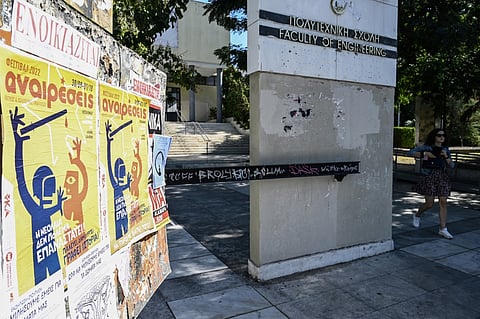

Over a year after it was conceived as a ground-breaking response to Greece's notoriously unruly universities, a special campus police force has officially deployed—to underwhelming results.
The squad of 1,000 officers deployed in September to four out of Greece's more than 20 university campuses. In Athens and second city Thessaloniki, all were chosen for having the highest instances of drug trading and petty crime.
"We haven't seen them," deadpanned one professor at Athens Polytechnic.
Armed only with batons, the freshly trained university protection squads (OPPI) have been deployed sparingly— and under the protection of seasoned riot police—following protests from outraged student groups.
"The campus police turned up once, there was uproar and they pulled back," said Sabina Kurrizi, a history student at Thessaloniki's Aristotelio University, also part of the initiative.
"Riot police are protecting the OPPI, who are supposed to be protecting us. It's absurd," she added.
Greek universities are chronically underfunded and notoriously disrupted by strikes, sit-ins and violence against students and staff.
Based on the most recent figures, Greece spent just under $4,100 per student in tertiary education in 2015, according to the Organisation for the Economic Cooperation and Development, compared to an OECD average of more than $15,600.
"Having a police squad guarding another police squad is surreal," said Theodoros Tsairidis, head of the Thessaloniki police officers' union.
'Safety'
"Must be a world first," he told AFP.
Inadequate state spending on education is a long-running concern in Greece.
In 2009, the year before the Greek economic crisis, the education ministry's annual budget was more than 7.2 billion euros ($6.9 billion). This year, it's less than five billion euros.
In 2020, the rector of Athens University of Economics and Business was assaulted in his office by a group of hooded youths, who put a sign around his neck that read "Solidarity to sit-ins."
Upon coming to power in 2019, the conservative government of Prime Minister Kyriakos Mitsotakis made law and order a top priority.
"Our government is determined to make the sense of safety in (universities) a reality," Citizen's Protection Minister Takis Theodorikakos said this week after the police raided Athens Polytechnic in an anti-gang crackdown.
More than 30 people were arrested in the swoop in connection with three gangs which turned part of a dilapidated student dormitory into a hideout, police said.
The Polytechnic is another campus chosen for the OPPI deployment.
"Prevention is always preferable to suppression," Deputy Education Minister Angelos Syrigos told daily newspaper Kathimerini on 20 September.
"Having a police force nearby creates a sense of safety, and could avert violent incidents or damage," he said.
